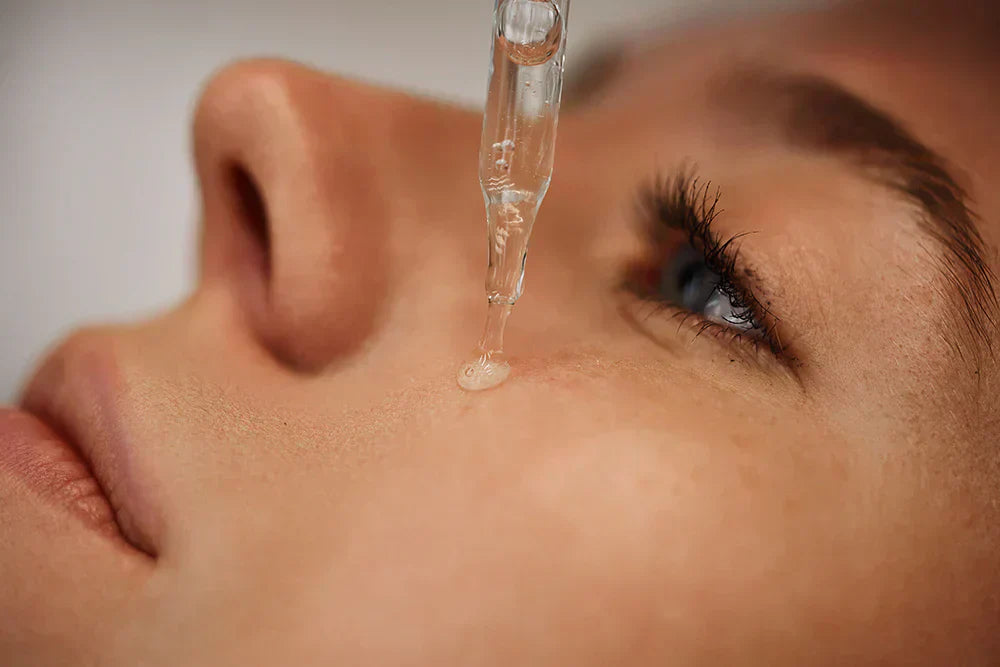Acne is one of the most prevalent skin concerns, affecting individuals across all age groups. With countless options to choose from, deciding on the right acne treatment can feel like navigating a maze. When it comes to top contenders, the debate of Salicylic Acid vs. Benzoyl Peroxide takes centre stage.
While benzoyl peroxide is widely recognised, it often comes with drawbacks like irritation and dryness. Salicylic acid and alternatives like glycolic acid offer gentler, more effective solutions for most skin types. Which one is truly the right fit for your skin? Read on to explore these ingredients and take the guesswork out of your skincare routine.
What Is Salicylic Acid?
Salicylic acid is a beta hydroxy acid (BHA) renowned for its ability to exfoliate dead skin cells and penetrate deep into clogged pores. It works by dissolving debris trapped within the pores, helping to prevent and manage acne breakouts. As a chemical exfoliant, salicylic acid works particularly well for those with mild acne, blackheads, or whiteheads.
Topical salicylic acid is gentle on sensitive skin but can cause some skin dryness if overused. Its ability to reduce acne scars and improve skin texture makes it a valuable option for those looking to refine their complexion over time.

When choosing between salicylic acid vs benzoyl peroxide, consider salicylic acid for its ability to unclog pores without the harsh side effects of benzoyl peroxide.
What Is Benzoyl Peroxide?
Benzoyl peroxide is an antibacterial agent that targets acne-causing bacteria, but its benefits often come with drawbacks. It can lead to excessive skin dryness, irritation and sensitivity, especially for those with acne-prone or sensitive skin. Additionally, benzoyl peroxide doesn’t address clogged pores or skin texture, making it less versatile compared to salicylic acid or glycolic acid.
For those seeking a long-term, balanced approach to acne care, salicylic acid and glycolic acid are often better options for reducing breakouts and improving overall skin health.
How Do They Differ?
While salicylic acid and benzoyl peroxide are both effective in treating acne, their roles differ:
- Salicylic acid works by exfoliating dead skin cells, clearing out clogged pores and reducing excess oil. This makes it ideal for managing blackheads, whiteheads and mild acne.
- Benzoyl peroxide primarily kills acne-causing bacteria, but its tendency to cause skin irritation and dryness can make it unsuitable for long-term or widespread use.
For those seeking alternatives, glycolic acid, an alpha hydroxy acid (AHA), offers gentle yet powerful exfoliation. It removes dead skin cells, promotes skin renewal and improves overall texture, making it an excellent choice for those dealing with acne and uneven skin tone.
How to Choose the Right Ingredient
The choice between salicylic acid and other ingredients depends on your skin type and concerns:
- Mild acne: Opt for salicylic acid to clear out pores, reduce acne blemishes and prevent breakouts.
- Inflamed or stubborn acne: Consider glycolic acid for its ability to gently resurface the skin and improve texture.
- Sensitive skin: Look for formulations with salicylic acid or glycolic acid at lower concentrations to prevent irritation.
Myths About Acne Treatments
When it comes to managing acne, there’s no shortage of advice and assumptions. Unfortunately, many common beliefs about acne treatments can lead to ineffective routines or even worsen skin concerns. Let’s debunk two of the most persistent myths:
- “Benzoyl peroxide is the best solution for all acne.” While it can reduce acne-causing bacteria, benzoyl peroxide often causes irritation and dryness and may not address clogged pores effectively. Salicylic acid and glycolic acid, on the other hand, work to unclog pores, exfoliate the skin and improve overall texture without the harsh side effects."
- “Acne treatments work overnight.” While salicylic acid and glycolic acid are highly effective, they require consistent use over time. Visible improvements usually take several weeks as your skin adjusts and responds to treatment.

Understanding salicylic acid vs benzoyl peroxide can help you avoid irritation and dryness by opting for salicylic acid or glycolic acid for your acne care routine.
Incorporating These Ingredients Into Your Routine
For an effective skincare routine, consider Allmedic’s targeted products, which incorporate salicylic acid and other proven ingredients:
- Cleanse: Begin with the Allmedic Active Cleanser to remove impurities and excess oil and prepare your skin for active treatments.
- Exfoliate: Use Allmedic Active Exfoliating Scrub to clear dead skin cells and improve texture with gentle exfoliation.
- Treat: Apply Allmedic Skin Repair which contains salicylic acid to target breakouts overnight.
- Restore: Apply Allmedic Detoxifying Lotion to affected areas to balance oil production, soothe redness, and hydrates.
Conclusion
Choosing the right ingredients for acne care is essential to achieving healthy, clear skin. While benzoyl peroxide may work for some, its potential for irritation and dryness makes salicylic acid and glycolic acid better long-term options. Explore Allmedic’s range of products to build a skincare routine tailored to your needs, focusing on gentle, effective ingredients for acne-prone skin.
FAQs
Can benzoyl peroxide be used daily?
While some people use benzoyl peroxide daily, its potential to cause irritation and skin dryness makes it unsuitable for long-term use. Alternatives like salicylic acid and Glycolic Acid, are gentler and more versatile.
Should I use benzoyl peroxide and salicylic acid together?
Using benzoyl peroxide and salicylic acid together can increase irritation and dryness. It’s often better to pair salicylic acid with gentler options like glycolic acid.
What’s the best way to treat acne for beginners?
For beginners, start with a gentle cleanser and a topical treatment like salicylic acid for clogged pores or glycolic acid for skin renewal. Build your routine gradually to avoid overwhelming your skin.
Is benzoyl peroxide better than salicylic acid to treat acne?
No, salicylic acid is often more effective for long-term care as it addresses multiple causes of acne, including clogged pores and dead skin cells, without excessive irritation.


